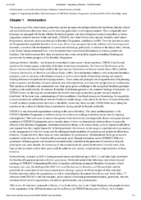Chapter 1 Introduction
Proposal review
the governance of UNESCO's Bioethics Programme
| dc.contributor.author | Langlois, Adèle | |
| dc.date.accessioned | 2019-10-17 15:08:39 | |
| dc.date.accessioned | 2020-04-01T12:40:17Z | |
| dc.date.accessioned | 2014-05-28 23:55 | |
| dc.date.accessioned | 2019-10-17 15:08:39 | |
| dc.date.accessioned | 2020-04-01T12:40:17Z | |
| dc.date.available | 2020-04-01T12:40:17Z | |
| dc.date.issued | 2013 | |
| dc.identifier | 1000026 | |
| dc.identifier | OCN: 1051776667 | en_US |
| dc.identifier.uri | http://library.oapen.org/handle/20.500.12657/29928 | |
| dc.description.abstract | The sequencing of the entire human genome has opened up unprecedented possibilities for healthcare, but also ethical and social dilemmas about how these can be achieved, particularly in developing countries. UNESCO's Bioethics Programme was established to address such issues in 1993. Since then, it has adopted three declarations on human genetics and bioethics (1997, 2003 and 2005), set up numerous training programmes around the world and debated the need for an international convention on human reproductive cloning. Negotiating Bioethics presents Langlois' research on the negotiation and implementation of the three declarations and the human cloning debate, based on fieldwork carried out in Kenya, South Africa, France and the UK, among policy-makers, geneticists, ethicists, civil society representatives and industry professionals. The book examines whether the UNESCO Bioethics Programme is an effective forum for (a) decision-making on bioethics issues and (b) ensuring ethical practice. Considering two different aspects of the UNESCO Bioethics Programme - deliberation and implementation - at international and national levels, Langlois explores: - how relations between developed and developing countries can be made more equal - who should be involved in global level decision-making and how this should proceed - how overlap between initiatives can be avoided - what can be done to improve the implementation of international norms by sovereign states - how far universal norms can be contextualized - what impact the efficacy of national level governance has at international level Drawing on extensive empirical research, Negotiating Bioethics presents a truly global perspective on bioethics | |
| dc.language | English | |
| dc.subject.classification | thema EDItEUR::P Mathematics and Science::PS Biology, life sciences::PSA Life sciences: general issues::PSAD Bioethics | en_US |
| dc.subject.other | unesco's bioethics programm | |
| dc.subject.other | bioethics | |
| dc.subject.other | genetics, medical | |
| dc.subject.other | program evaluation | |
| dc.subject.other | ethics, medical | |
| dc.subject.other | international cooperation | |
| dc.title | Chapter 1 Introduction | |
| dc.title.alternative | the governance of UNESCO's Bioethics Programme | |
| dc.type | chapter | |
| oapen.relation.isPublishedBy | 7b3c7b10-5b1e-40b3-860e-c6dd5197f0bb | |
| oapen.relation.isPartOfBook | ee1c0efc-4258-4309-8acd-c48d501a5776 | |
| oapen.relation.isFundedBy | d859fbd3-d884-4090-a0ec-baf821c9abfd | |
| oapen.relation.isbn | 9780203101797 | |
| oapen.collection | Wellcome | |
| oapen.imprint | Routledge | |
| oapen.pages | 192 | |
| oapen.chapternumber | 1 | |
| oapen.grant.number | 075315 | |
| oapen.identifier.ocn | 1051776667 | |
| peerreview.anonymity | Single-anonymised | |
| peerreview.id | bc80075c-96cc-4740-a9f3-a234bc2598f1 | |
| peerreview.open.review | No | |
| peerreview.publish.responsibility | Publisher | |
| peerreview.review.stage | Pre-publication | |
| peerreview.review.type | Proposal | |
| peerreview.reviewer.type | Internal editor | |
| peerreview.reviewer.type | External peer reviewer | |
| peerreview.title | Proposal review | |
| oapen.review.comments | Taylor & Francis open access titles are reviewed as a minimum at proposal stage by at least two external peer reviewers and an internal editor (additional reviews may be sought and additional content reviewed as required). |

